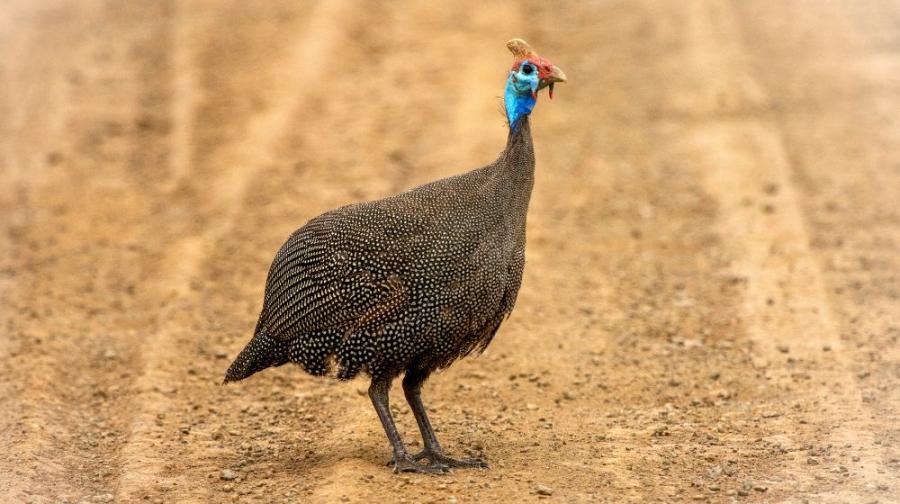A New Member of the Flock?

Some of you may have noticed the lone Guinea Fowl who randomly showed up one day on the church property. We have no idea how it got here or where it came from. We posted its picture on the Northfield Lost and Found Pets Facebook page and a few folks came forward saying they would give it a home if its actual home was not found. (If they can catch it.)
While Guinea Fowl are not something I would normally think about, (because why would I?) seeing this one show up at the church did bring back some memories as a kid growing up on the farm. Our neighbors down the road had a flock of Guineas. They were the strangest creatures, not very bright, they liked to wander the neighborhood and could at times be mean. The whole flock would stand in the middle of the road ignoring all vehicles and I can remember the school bus having to stop and wait for them to move. As kids on the bus, we thought it was funny, but I don’t think our bus driver saw any humor in having to chase these odd birds off the road on a regular basis.
As you all know by now, being around animals is my “happy place” and the best therapy, in my opinion. The only photo on my desk is of my dog Fletcher and I keep a bag of dog treats in my desk drawer for any visiting pups. Watching this lonely bird wander the grounds of the church of course got me interested in learning more about Guinea Fowl. Yes, I am obsessed with learning about an animal when I see it. I’m the person at the party who spends the entire time petting and talking to the dog. What I discovered about Guineas, however, was for such an unusual animal their roots are very deep in symbolism. I found this fascinating. If you are not familiar with what a Guinea Fowl looks like, I can only explain it as a round bodied speckled bird, with a featherless head and a beak like a chicken. This bird looks like it was put together by a committee with left over parts. The saying “don’t judge a book by its cover” really fits this creature.
Guinea Fowl originated in Africa and have been around for hundreds of years. There are even drawings of them on the walls of the pyramids. African tribes connected Guinea Fowl to many different meanings. It was a symbol of resilience, hard work, endurance, productivity, justice, cooperation, protection, care, and companionship. No wonder this bird ended up on the NUMC campus.
Guinea Fowl are very social within their group. They will all move around together, unlike chickens who are more independently minded. Because they are a flock bird, if one Guinea gets separated from the rest it will keep calling until the flock come to find it. Their call is loud and very distinctive with their double clack-clack sound. Guineas choose their partner and mate for life. They have a sense of loyalty to each other, and will protect each other and their flock. Reading this personality trait made me feel bad for Wesley. Did I forget to mention I named him? I was never good at following the rule my dad used to tell us as kids on the farm… “don’t name the farm animals”. Of course, I named them all. Anyway, I noticed Wesley sticks close to the building and will often peck at the windows. I believe he sees his own reflection in the window but thinks its another Guinea and is looking for companionship. I also on occasion hear his clack-clack sound from outside the office window. While maybe annoying to us humans, very sad for the lonely Guinea.
Since Wesley does stick close to the building, he is very visible at times and has become a great topic of conversation around the church. “What is that weird looking bird outside?” “Have you seen the guinea today?” “The guinea left an awful mess right outside the door.” When I sent Pastor Rachel an email telling her about Wesley and that there was a “rescue” mission in the planning with some folks from the lost pet Facebook page, she responded with this somewhat adjusted version of Matthew 18:10-14. (She changed it from “sheep” to “guinea hen”)
Then Jesus told them this parable: 4 “Suppose one of you has a hundred GUINEA HENS and loses one of them. Doesn’t he leave the ninety-nine in the open country and go after the lost GUINEA HEN until he finds it? 5 And when he finds it, he joyfully puts it on his shoulders 6 and goes home. Then he calls his friends and neighbors together and says, ‘Rejoice with me; I have found my lost GUINEA HEN.’ 7 I tell you that in the same way there will be more rejoicing in heaven over one sinner who repents than over ninety-nine righteous persons who do not need to repent.
My response back was “the Guinea is going to end up in a sermon, isn’t it?” Her response: “Of course, as all excellent stories do”. So, this is your fair warning, be prepared on any given Sunday for the sermon of the lonely Guinea from Pastor Rachel.
Other than the mess Wesley leaves us on the sidewalk in the worst places at times, and the fact that he is probably lonely, having him on the grounds is not a bad thing. Guinea Fowl do a great job of pest control. They feed on various insects, bugs, ticks, fleas, beetles, crickets, worms, grasshoppers, and spiders. They are great for keeping these pests from eating gardens and flowers. Guinea Fowl protect the health of other animals and even people by eating dangerous pests. They are typically quiet(ish) but do make a raucous noise whenever they notice something unusual, which can be exceptionally useful — or a nuisance, depending on your priorities. It’s this “watchdog” quality that makes them an asset, sounding the alarm to alert you and other animals to danger. Because of this trait, many farmers keep Guineas around to sound the alarm when a predator is near, thus protecting the other animals.
So, while Wesley may be a good addition for keeping pests away, it would be great if he were reunited with his flock or a new flock. Just like humans, he wants companionship. One of the folks who plans to try to “rescue” Wesley says the easiest time to catch a Guinea is at night as they have very bad eyesight in the dark. I’m hoping they are successful. He’s been here for a while now and I do enjoy being greeted by him early in the morning when I arrive for work or turning around to see him sitting on the ledge outside the office window watching us, but hopefully by the time this article is published, Wesley will have been rescued and relocated to a new home. If not, I guess we become his flock.
I do believe there is a takeaway from Wesley’s visit to NUMC. This creature of God’s who doesn’t necessarily look like we think it should, may be a little noisy, has a reputation for being not very bright or even a bit ornery, also has the ability to love, seeks companionship, is very loyal, wants to always protect its neighbors and is capable of living in harmony with flocks of other species. Hmm…a good lesson for us humans. I believe we can learn a lot from the animals. When it comes right down to it, don’t we all seek the same things? Perhaps we are more alike than we think.
I will end this article with a quote I found in my quest to learn more about these birds: “As a spirit animal, the Guinea fowl will remind you to be resilient and never give up. When you are in a bad phase of your life, the Guinea fowl reminds you that good times are waiting for you.”
Thanks for hanging out with us Wesley, it’s great having you as a part of our flock…all really are welcome here at NUMC. Sandy Vesledahl - NUMC Office Administrator and Church Grounds Animal Research Specialist
Sidenote: If you do see Wesley on the NUMC grounds please do not try to get close to him as we don’t want to scare him away or make him more skittish than he already is as that will make it harder for his rescuers to catch him. Thanks!
